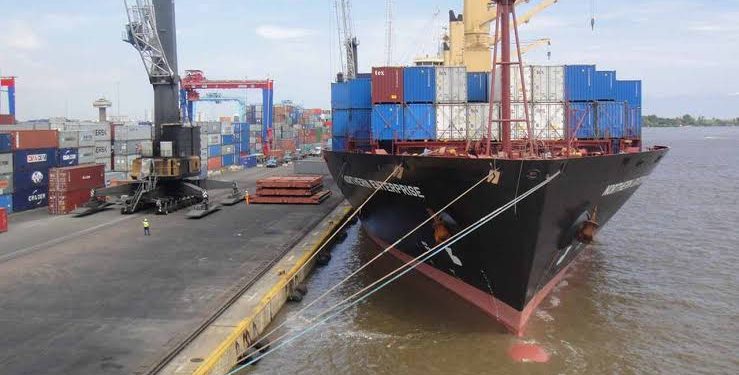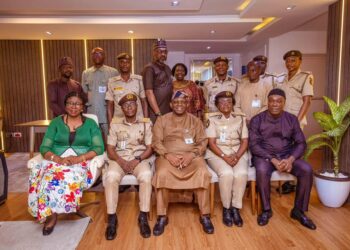
Nigerian ship owners have highlighted reasons for the prolonged delay in the disbursement of the Cabotage Vessel Financing Fund (CVFF) to indigenous players. This is even as they remain optimistic and emphasised the importance of continued engagement and cooperation with the government.
The CVFF, which was conceived almost two decades ago to provide critical financial support to indigenous shipowners for vessel acquisition, has been a central issue in the discourse surrounding Nigeria’s maritime industry. The fund was established with the goal of boosting local participation in coastal maritime trade, reducing the country’s reliance on foreign vessels, and fostering economic growth.
Despite years of delays and numerous challenges, recent engagements with government officials have provided a glimmer of hope for the maritime sector.
Shipping Position Daily recalls that the Minister of Marine and Blue Economy, Mr Adegboyega Oyetola, during a recent stakeholders’ engagement with the ship owners and port operators, said he was committed to delivering the disbursement of the CVFF to enhance efficiency, transparency, and competitiveness in the sector.
In the same vein, the Director General, Nigerian Maritime Administration and Safety Agency (NIMASA), Dr Dayo Mobereola, said the agency had listened to the issues raised by stakeholders including the CVFF, adding that all the stakeholders would be included in government policies to enable them to improve port safety and security to attract more vessels to call at Nigerian ports.
In a chat with the President, Nigeria Ship Owners Association (NISA), Otunba Sola Adewumi, he elucidated the complexities surrounding the CVFF disbursement. He highlighted the uncertainty that has plagued the disbursement process, suggesting that the political will of the government might have been lacking.
According to Adewumi, the previous administration had cited issues with banks, particularly disagreements over interest rates, as a major barrier to the fund’s disbursement. However, he noted that ship owners cannot confirm whether it is true or not, because the banks have refused to talk to them.
Echoing the sentiments of ship owners who are anxiously awaiting further developments, the NISA President expressed optimism that the government’s renewed commitment will be made towards unlocking the CVFF for the benefit of the maritime industry.
“The new administration said they are going to disburse it. So let’s wait for them and see what is going to come out of it. But they kept on re-emphasizing that it is going to be disbursed and the ship owners are waiting for them to come out with the modality.
“The last administration said they have problems with the banks that they were not able to agree on the interest rate they really wanted them to implement. But we cannot confirm whether it is true or not, because the banks are not talking to ship owners. They are only talking to the ministry” Adewumi said.
Also speaking, the Chairman of the CVFF Committee set up by NISA, Dr. Edward Sowho acknowledged that one major challenge that have contributed to the delay in CVFF disbursement is the issue of interest rates imposed by banks on ship owners.
Sowho also noted that the change in government administration particularly between the Ministry of Transportation and the transition into a new Ministry of Marine and Blue Economy have greatly contributed to the back and forth of the CVFF disbursement.
Looking ahead, Sowho outlined plans for continued engagement with stakeholders to ensure the smooth progression of the disbursement process. With unwavering determination and confidence in government authorities, Sowho expressed optimism that the CVFF would soon be disbursed.
“Based on what the Minister and the DG NIMASA said during the stakeholders’ meeting, they are pro-disbursement and they also know the importance of such disbursement. We believe that this disbursement will be done very soon; once they work out the modalities. The main problem for a protracted non-disbursement of the CVFF has been interest rates from the banks. That is really the main problem.
“We may intensify the engagement, but we will also identify individuals that are mitigating the gap and address those issues. With further engagement, we have absolute confidence in them that the funds will be disbursed. I don’t think we have a problem”, Sowho noted.
The National President of the National Association of Master Mariners, Captain Tajudeen Alao reiterated the urgent need for access to the CVFF to revitalize the Nigerian shipping industry, while highlighting the challenges hindering the disbursement of the fund.
According to Captain Alao, the CVFF Act clearly outlines the procedures for administering and approving disbursements. He explained that despite efforts to fine-tune the guidelines, stakeholders have struggled to meet the stringent requirements, particularly regarding contributory equity and collateral.
Alao stressed that establishing a new shipping company and acquiring a vessel compliant with the International Safety Management (ISM) code is a capital-intensive endeavor.
Often necessitating substantial financial investment, the Master Mariner stressed that providing financial support to aspiring ship owners and facilitating the acquisition of modern, compliant vessels, the fund has the potential to enhance the competitiveness of Nigerian shipping companies on both domestic and international fronts.















